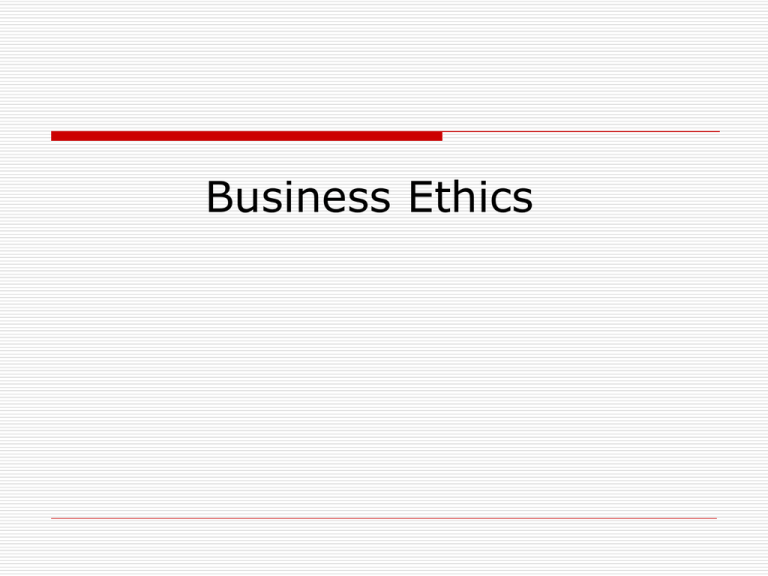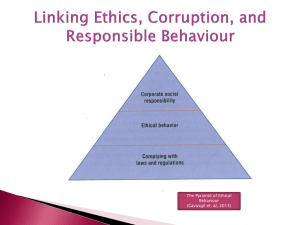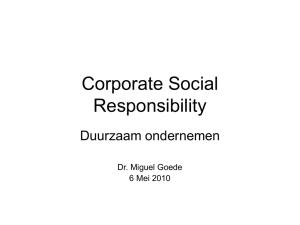Business Ethics Fundamentals
advertisement

Business Ethics TRUSTEESHIP MANAGEMENT Gandhian Philosophy of Wealth Management Trusteeship, as applicable to the corporate world, refers to the act of holding and managing resources on behalf of the stakeholders of the firm. TRUSTEESHIP MANAGEMENT Gandhian Philosophy of Wealth Management Gandhian Philosophy of wealth management is based on the ‘Servodaya’ principles of Truth, Non-Violence and Trusteeship; wherein class harmony between labour and management reigns supreme. According to Gandhiji, managers and proprietors of business firms are only the trustees of wealth of society. The idea of trusteeship advocated by Gandhiji, is based on and has its origin in the Bhagaved Gita-in the principles of ‘aparigraha’ (non-possession) and ‘Sambhawa’ (equalism) which were ardently followed by Mahatma Gandhi. Unlike the Utilitarian motto of ‘greatest good of the greatest number’ known as Teleology, Gandhiji’s motto was ‘greatest good of all’. Gandhiji’s views management relations on labour My ideal is that capital and labour should supplement and help each other. They should be a great family living in unity and harmony; capital not only looking to the material welfare of the labourers, but their moral welfare also-capitalists being trustees of the welfare of the labouring classes under them. Gandhiji’s views management relations on labour Gandhiji assigned a paternalist role to management in their dealings with labour Gandhiji considered trade unions to be means of workmen’s material and moral development. He declared that a strike is an inherent right of the working man for the purpose of securing justice, but they must be considered a crime immediately the capitalists accepts the principle of arbitration. If conflict arises between labour and management, the weapon proposed by Gandhiji is Satyagraha Gandhiji’s principle of Trusteeship Trusteeship principle is foundation philosophy of wealth management of Principles of Trusteeship No recognition to right to individual property Resources must be held and utilised for the benefit of society. Management is the trustees of the stakeholders and must work towards optimising stakeholder value, not merely maximising shareholder value Gandhiji’s principle of Trusteeship In case of industrialist what they produce should be determine by social necessity with optimal utilization of scarce resources and not by personal whims If workers are to work with harmony and collaboration with management then that make workers also co-trustee with the management Though wealth legally belongs of owners of business, morally belongs to society and community Seven greatest Sins Politics without principles Education without character Commerce without morality Pleasure without conscience Wealth without work Science without humanity Worship without sacrifice Indian Corporate Leaders and Trusteeship Infosys, particularly from its former CEO and current chief mentor, Narayana Murthy for creating this company along with a small group of people (better sharing of wealth in society), the involvement of employees in the company’s fortunes (through ESOPs) and his contentment with a mere 7% of company stock (he prefers it that way) reflect a deep-rooted commitment towards trusteeship. House of the Tatas with their corporatised initiatives for socio-corporate benefits “WIPRO Cares” Foundation, with a targeted corpus of Rs 100 crore for primary education; Birla foundation with its focus on socio-economic improvement in the lives of the people touched by the corporation. Social & Economic Responsibilities of Business Reference books Representations of Social Responsibility Vol.II edited by David Crowther/Renu Jatana Corporate Social Responsibility: Ethical and Strategic Choice by Jayanta Bhattacharya Corporate Social Responsibility: Concepts and Cases - The Indian Experience Edited by C. V. Baxi and Ajit Prasad Essentials of Aswathappa Business Environment: K. Meaning of CSR By the term ‘Corporate Social Responsibility’ (CSR) what is generally understood is that business has an obligation to society that extends beyond its obligation to its shareholders or owners. Ten Principles: The Global Compact Human rights 1. Businesses should support and respect the protection of internationally proclaimed human rights; and 2. Make sure that they are not complicit in human rights abuses. Labor standards 3. Businesses should uphold the freedom of association and the effective recognition of the right to collective bargaining; 4. The elimination of all forms of forced and compulsory labor; 5. The effective abolition of child labor; and 6. The elimination of discrimination in respect of employment and occupation. Ten Principles: The Global Compact Environment 7. Business should support a precautionary approach to environmental challenges; 8. Undertake initiatives to promote greater environmental responsibility; and 9. Encourage the development and diffusion of environmentally friendly technologies. Anti-Corruption 10. Business should work against all forms of corruption, including extortion and bribery. The Global Compact There are now some 90 Indian companies, which have signed up to the UN Global Compact. More than 649 companies globally have signed the Global Compact (www.unglobalcompact.org) Definition of CSR CSR means operating a business in a manner that meets or exceeds the ethical, legal, commercial and public expectations that the society has of business”. The World Business Council for Sustainable Development defines CSR as: “the continuing commitment by business to behave ethically and contribute to economic development while improving the quality of life of the workforce and their families as well as of the local community and society at large”. Key Elements in Definition of CSR Corporations have responsibilities that go beyond the production of goods and services at a profit. These responsibilities involve helping to solve important social problems. especially those they have helped create. Corporations have stockholders alone. a broader constituency than Corporations have impacts that go beyond simple marketplace transactions. Corporations serve wider range of human values than can be captured by a sole focus on economic values. Social Responsibilities of Business – Archie B Carroll Economic Responsibility Legal Responsibility Ethical Responsibility Discretionary Responsibility To whom Business Organizations are responsible????? Primary Stakeholders Secondary Stakeholders Relations between a business firm and its primary stakeholders Employees (Unions) Stockholders Wholesalers (Retailers) Distribute products Sell labor Business firm Buy products Customers Invest capital (Managers) Lend money Sell materials Suppliers Creditors Relations between a business firm and some of its other (secondary) stakeholders The General Public Business Support Groups Local Communities Positive, negative opinion Advice, research Jobs, environment Regulation, taxes Business Firm (Managers) Friendly, hostile Image, publicity Media Central/State and Local Governments Social demands Social Activist Groups Governments Social Responsibility Debate: Arguments in Against In Friedman’s view business has only one social responsibility and that is to maximize the profits of its owners. His very famous statement says it all, “The business of business is business.” Distorts allocation of Resources Business lacks training in social issues, and lacks social skills necessary to carry out social programs. Social policy is the jurisdiction of governments, not business Increase in business Power Social Responsibility Debate: Arguments in Favor Corporations have too much power In 1999 the United Nations reported that the world’s then three richest people-Bill Gates of Microsoft, the Sultan of Brunei and the Walton family of the Wall Mart retail chain were worth more than the combined GDP of the world’s 34 poorest nations. “With great power and size comes great responsibility.” How Does CSR benefit Business??? Reputation Less Law Suits Loyal Employees & Customers Less Media Harassment Access to Capital Improves Improves Productivity Better Environment Community Goodwill DIFFERENCE GOOD COMPANY GREAT COMPANY Excellent Products & Services Excellent Products/services & Makes the world a better place Developments of CSR in India First Phase :Merchant charity – Dates back to Vedic period – Religious and social ethics Relief in natural disasters Dharam Shalas Drinking water Developments of CSR in India Second Phase Trusteeship Social responsibility was brought into community’s consciousness goes principally to business leaders like JRD Tata, Ramakrishna Bajaj, Arvind Mafatlal, Kasturbhai Lalbhai. Vinoba Bhave on whom Gandhiji’s mantle had fallen wanted businessmen to interest themselves in humanitarian, educational and other beneficial social activities and consider business as a social mission while promoting the ‘trusteeship of wealth’ theory of Gandhiji whereby owners and workers were co-trustees of business for society. Developments of CSR in India Third Phase responsibility Declaration of social Role of Jaiprakash Narayan – Organized Conferences on responsibilities of business Setting up of ‘Fair Trade Practices Association’ by Tata, Bajaj and others Developments of CSR in India Fourth Phase Managerial Trusteeship 1970s & later – realization that continued profitability depended on involvement towards development of society Importance of ethical business practices and concern for the environment in which the business operates was also recognized. Developments of CSR in India Fifth Phase Corporate citizenship Realization that if social development is neglected, business cannot prosper. Government alone cannot handle all social issues. Traditional drivers for CSR Values Strategy Public Pressure Present Drivers for CSR Corporate Social Performance Stakeholder Management Corporate Environment Management Consumer Pressure Risk Management and Sustainability Business Ethics Attracting employees Personal Values Significant Drivers of CSR ic s op Ph i la nt hr M ee oy pl Em Et h al or in g ld Bu i ag e hy 70% 60% 50% 40% 30% 20% 10% 0% Im % of Com panies W hy do it??? Social Audit Gerald Vinten defines social audit as “a review to ensure that an organization gives due consideration to its social responsibilities to those both directly and indirectly affected by its decisions, and that a balance is achieved in its corporate planning between these aspects and more traditional business related objectives” Area of Social Responsibility Respecting Human Rights: not discriminating against caste, creed, gender, etc Contributing to socio-economic development Employee Welfare: which includes the right to organize, eliminating child labour, non-discrimination, living wage and social security, training, safety, health and wellbeing, lifelong learning, empowerment of employees, share ownership schemes etc. Consumer Protection: includes right to information, impact of product on local market, etc Respect for national sovereignty and local communities by multinationals. Areas of Social Responsibility Participating in academic research. Share resources with under-privileged communities e.g., transportation and medical facilities with the community senior citizens, etc. Community Investments e.g., companies can invest in sustainable development Programmes for the community. Socially Responsible Investments e.g., Investors should to invest in companies who follow responsible business practices Share expertise and knowledge with peers and learn from others experience. Areas of Environmental Responsibility Respect for the Environment Environmental friendly technologies: investment in ecofriendly technologies. Use, conserve and discharge: energy, material and water in an eco-friendly manner. Adopt preventive and precautionary measures for environment pollution control. Educate employees and the community to take collective, preventive and precautionary measures to reduce environmental pollution. Rectify environmental damage at source: Treat waste before disposing it. Bio - diversity preservation Promote and implement an environmental policy for sustainable energy and sustainable environment. Areas of Business Responsibility Compliance with Tax Laws and other regulations. Corporate Governance: Transparent Financial Auditing / Verification and Accountability; customer redressals and grievances. Reporting; addressing Invest in developing science and technology. Foster ethical trade practices Regulate supplier’s CSR practices and distributor’s CSR practices. e.g. stop working with suppliers and distributors who do not follow responsible business practices Transparent financial reporting : Public financial reports in newspapers for public information. Steps to implement CSR Mainstreaming CSR vision in Articles of Association Develop a written policy CSR and make it available in the public domain Assessment of internal environment Identification of drivers and barriers to change Assessment of core competencies of the company Building in the strategic business case Assessment of external environment Legal Context & Development Context Identification & prioritization of the opportunities for corporate collaboration Putting CSR policy in the public domain Steps to implement CSR Translating CSR policy into action Reporting, experience sharing and mutual learning External reporting and certification Why companies do not take up CSR??? Markets do not reward ethical companies Lack of clear definition of CSR Systematic denial of wrong doings Location of CSR on the periphery of the corporate structure Thank You








